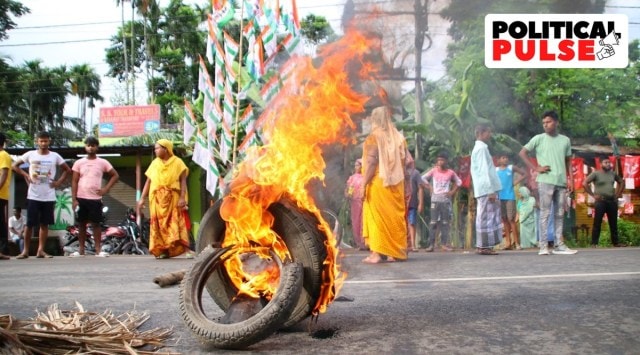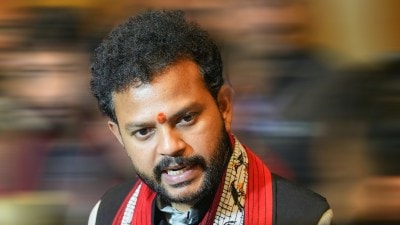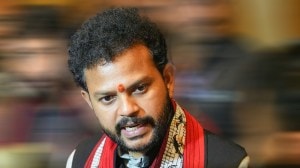WITH THE panchayat polls in West Bengal on Saturday marked by widespread violence, despite court-ordered deployment of 822 companies of Central forces or nearly 70,000 personnel, blame game has begun.
Even as polling was on, BSF IG S C Budakoti, the coordinator of Central forces in the state, wrote to State Election Commissioner Rajiva Sinha complaining that they were not given adquate information for proper deployment. Sinha, on the other hand, has said that the Central forces failed to reach on time, with many landing only in the final hours of polling even in areas which have been seeing violence for days.

The BJP has claimed that in many places, Central forces were not deployed at all.
In his letter to Sinha, Budakoti wrote that as per orders of the Calcutta High Court, “we were assigned to deploy CAPF / SAPs in consultation with the State Election Commission (SEC) at sensitive booths… After discussions on the issue during meeting on 6th July… you only provided district-wise list of sensitive booths and polling booths / premises… District-wise figures of sensitive booths without the details of booth no. block and panchayat (does not make it) possible to identify the booths for deployment of troops.”
With polling on, Budakoti said that “in spite (of) our repeated verbal and written requests, so far no details of sensitive booths have been provided to us”. Calling this “non-cooperation” from the SEC, Budakoti said this meant they were not able to deploy troops as needed.
Speaking to journalists at the end of the day, State Election Commissioner Sinha blamed the Union Ministry of Home Affairs for the confusion on deployment of Central forces. He said: “We gave requisition on June 25 for 822 companies of Central forces and we gave details. If the Central government (had) sent us the whole Central forces quickly, we (would have) deployed them more successfully… They were able to send only 660 companies till polling day.”
According to sources, in sensitive areas like Bhangar and Arambagh, the Central forces reached after the completion of the polling process.
Story continues below this ad
Political parties waded into the row, with the BJP batting in favour of the Central forces. Party leader Dilip Ghosh said, “The SEC did not use the Central forces. I saw them sitting idly in a bus. In many places, Central forces were kept at police stations.”
CPI(M) leader Shatarup Ghosh said they were not surprised at what had happened. “So, from the very first day, we did not depend on anybody. We decided that given the state of affairs, democracy can be restored only by the people, and we turned to them.”
The Congress and BJP had moved court seeking deployment of Central forces. There were no Central forces during the last panchayat polls, held in 2018, and the widespread poll violations at the time saw the ruling Trinamool Congress win 34% of the seats uncontested.
Congress state president Adhir Chowdhury blamed the late arrival of the Central forces for the violence on Saturday, claiming this happened “under the instructions of the Union Home Minister and BJP in New Delhi”. “They have an understanding with the TMC in Bengal and that is the reason the Central forces were late in coming. They gave the TMC the opportunity to loot votes because, in the future, Didi (Mamata Banerjee) will be a gaddar (traitor) and break the proposed Opposition front.”
Story continues below this ad
TMC leader Kunal Ghosh said Central forces could not just wash their hands of what happened. The TMC has been pointing out that it lost the maximum cadres in Saturday’s violence. “Wasn’t deployment of Central forces the main demand of the Opposition? Now, why aren’t they being blamed for mishandling the entire voting process? Instead, the media is busy blaming the state government,” Ghosh said.
In its final order on Central forces, three days before polling, the Calcutta High Court had directed that the deployment at polling stations should be half and half, of state police and Central forces. It also said that “considering the extraordinary situation which led to issuance of direction for deployment of Central forces”, changes could be made to the number of personnel deployed.
The court also authorised Budakoti, as the coordinator of the Central forces, to issue appropriate directions to ensure that their personnel “cover all polling stations in the state”.
However, that seemed difficult from the start. As Budakoti wrote in a letter to the Home Ministry on Thursday, two days before polling, given the number of troops at his disposal, he would have to spread them out thin, meaning one personnel per polling station. “Keeping the present scenario in WB state, any kind of violence / booth capturing attempt can’t be overruled. A single CAPF personnel will not be able to take any action and there will be a life threat to that person,” Budakoti wrote.
Story continues below this ad
After this, a formula was worked out to have a minimum of four personnel from Central forces, apart from four of state police, for a polling station that had up to two booths.
Figuring this out, ensuring safety of men as well as covering all bases, also took time, leading to the delay, sources said.

































